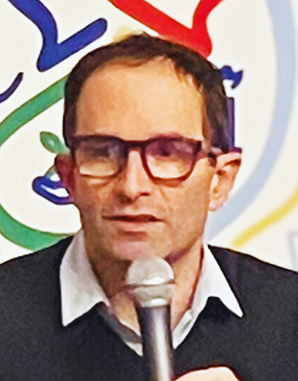The Global Social Economy Forum in Bordeaux (October 29-31, 2025) comes at the right time, and we can observe an acceleration at international level: 2 resolutions over 2 years (April 2023 and November 2024) on the SSE issue, on the link between this entrepreneurial model, this economy and the objectives of sustainable development. A number of countries are focusing on the SSE issue, perhaps to finally devise a theory of change that combines economy and ecology in the face of certain climate disruption – How to organize this shift of our economies, this transition to the SSE scale. We need a theory and a strategy and, spontaneously, international organizations, as well as governments, are seizing on the SSE issue to develop strategies that will enable us today to meet the challenges of the fight against climate disruption and the way in which we are committing the economy to the path of greater temperance of our economic models. The economic question, and in particular the pivotal role of the SSE in the global economy, will be more present than ever in the minds of both political leaders and the countless citizens who are involved in the SSE every day.
Today, when we mention the SSE, we realize that it eludes rationality. For example, the cumulative sales of the cooperative economy in France amount to 380 billion euros. Let’s compare the sales of cooperatives with those of French start-ups. According to the French National Bank, the sales of the latter represent 25 billion euros. 15 times more for cooperatives than for start-ups. Do we have the feeling that public policies devote 15 times more energy, means, resources and borrowing capacity to cooperatives than to start-ups? I don’t mean to denigrate start-ups, but with a cooperative, you can be sure that they won’t change their flag, that they won’t become American or Chinese in five years’ time. We’re a little less sure about a start-up. Cooperative employment is local, territory-based employment, which today creates links, economic activity and production, and provides benefits for the local area. If there were a slight rebalancing of public authorities’ interest in the SSE, we’d be closer to a form of rationality in our approach to economic issues.
The consequences of the Finance Bill in France are estimated at 180,000 job losses in the SSE sector. Even the MEDEF -Movement of Enterprises of France- is outraged, claiming that this bill is a danger for the regions, with the risk being the destruction of economic activity. ESS France corroborates this risk, explaining that this economic activity is concentrated on the kilometer of general interest, where we find a mutualist EHPAD -Residential facility for dependent elderly people- an associative nursery, a recycling center.
Unfortunately, a job in the SSE sector is still considered less sacred than a job in a factory. I’m not in favor of desanctifying a factory job. I just hope that these more feminine, more territorialized, more service-oriented SSE jobs are defended with the same energy -especially when the mere fact that one of them disappears- leads to the destruction of a thousand and one social links that are associated with each of these jobs.
That’s why – and this is our aspiration at ESS France – the SSE, in the future, is not demanding a separate status, but that it should benefit from the same consideration under common law as all other forms of enterprise, a fortiori when it delivers these additional services to the nation.
The GSEF in Bordeaux is an opportunity to voice what SSE is in the world; and for France to regain a form of leadership on these issues that it has had, and still retains, in terms of the social economy, since France’s particularity is that it hosts all forms of social economy: associations, commercial SSE enterprises, numerous cooperatives, mutual societies, foundations. Where other countries sometimes only have cooperatives or mainly associations, this is not the case here in France. That’s why the SSE in France generates so much innovation. And I’m sure that the GSEF in Bordeaux will be an opportunity to highlight not only the social innovation produced by the social economy worldwide, but also France’s ability to generate these social innovations and to provide solutions to the economic, social and democratic problems of the French people and citizens of the world.







